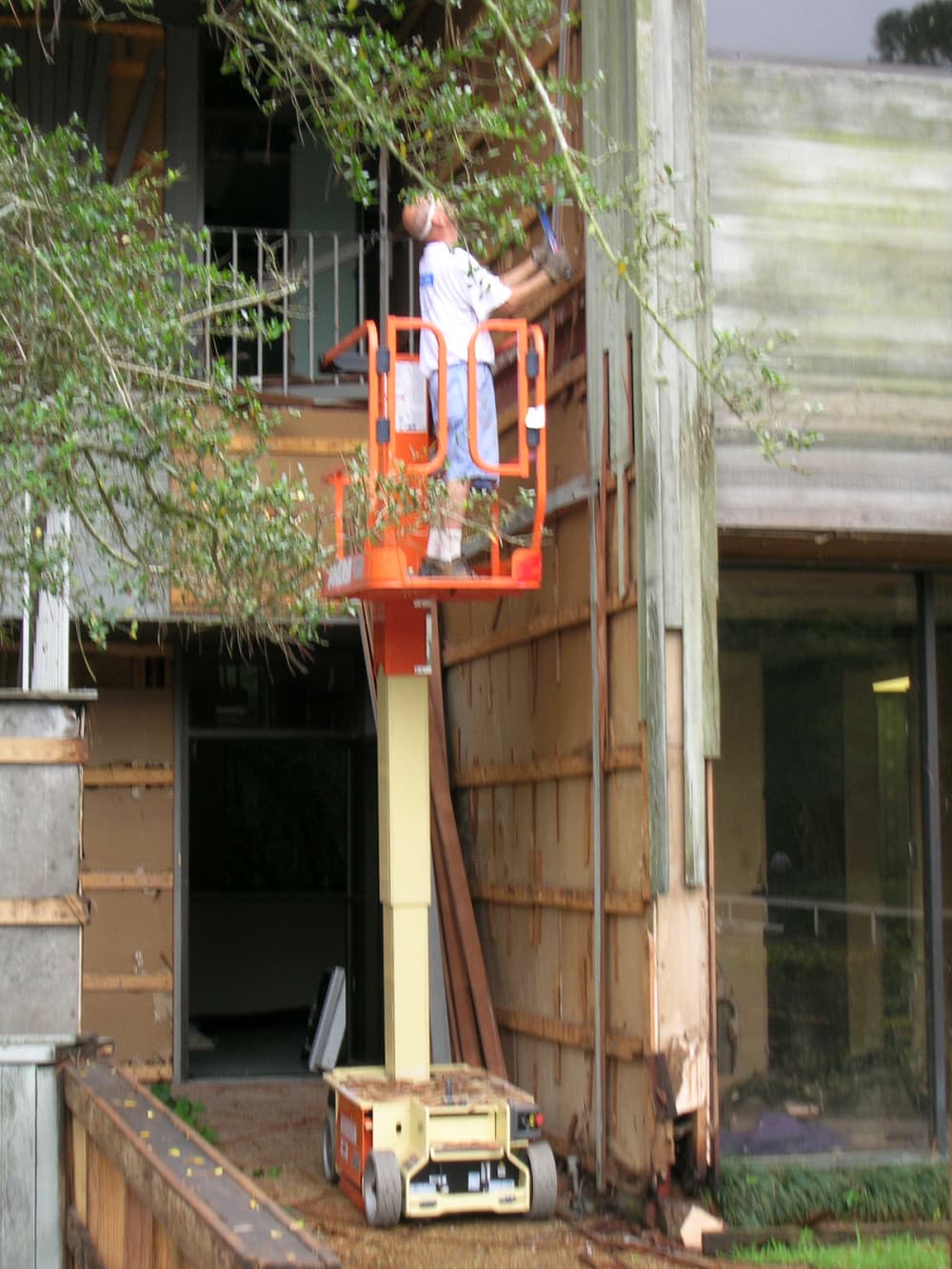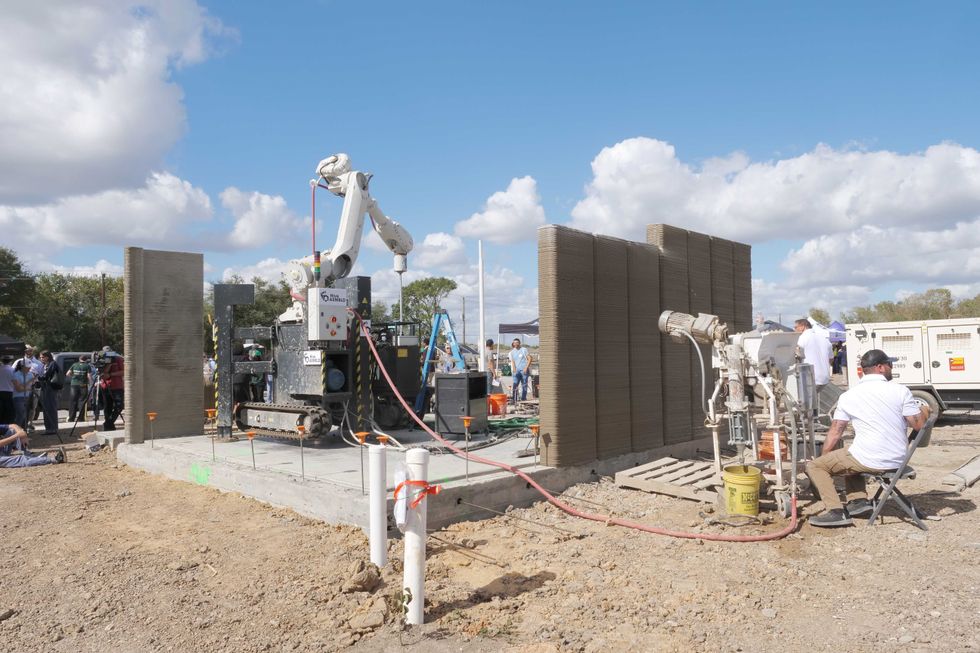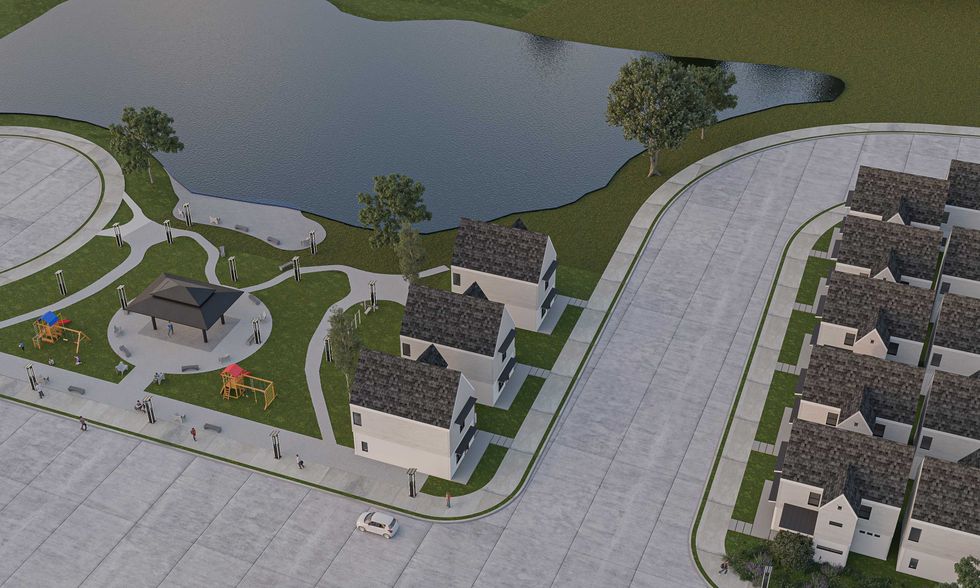Houston is putting itself front-and-center to help make sustainable, affordable housing a reality for 80 lucky homeowners in a scalable housing community that will hopefully catch on nationwide. Recently, developer Cole Klein Builders partnered with HiveASMBLD to pioneer what’s touted as the world’s first large-scale, one-of-a-kind, affordable housing development using 3-D printing technology, merging robotics, design, and sustainability.
Located across from Sterling Aviation High School, near Hobby Airport, Zuri Gardens will offer 80 two-bedroom, two-bathroom homes of approximately 1,360 square feet situated in a park-like setting, including walking trails and a community green space.
Homes in Zuri Gardens will hit the market in early summer of 2026. Final pricing has yet to be determined, but Cole Klein Builders expects it to be in the mid-to-high 200s.
Interestingly, none of the homes will offer garages or driveways, which the developer tells CultureMap will provide a savings of roughly $25,000 - $40,000 per home.
Instead of parking for individual units, 140 parking spaces will be provided. Ideally, this small-town-inspired design will provide opportunities for neighbors to meet, connect, and build community.
Each two-story home is comprised of a ground floor printed by HiveASMBLD, using a proprietary low-carbon cement alternative by Eco Material Technologies that promises to enhance strength and reduce CO2 emissions. The hybrid homes will have a second floor built using engineered wood building products by LP Building Solutions. Overall, the homes are designed to be flood, fire, and possibly even tornado-proof.
The Zuri in Zuri Gardens is the Swahili word for “beautiful,” a choice that is fitting considering that the parks department will be introducing a five acre park to the project — with 3-D printed pavilions and benches — plus, a three acre farm is located right across the street. The Garver Heights area, where Zuri Gardens is located, is in what’s classified as a food desert, which means that access to fresh food is limited. Residents will have access to the farm’s fresh produce, plus opportunities to participate in gardening and nutrition workshops—that’s a win for everyone.
With the novelty of Zuri Gardens, it’s no surprise that the neighborhood already has an 800 person waitlist, but with stringent buyer requirements, it’s unclear how many of those 800 will qualify. Developer Cole Klein Builders created Zuri Gardens in partnership with the Houston Housing Community Development Department, who provided infrastructure reimbursements for the roads, sewer lines, and water lines. In return, CKB agreed to push the purchase prices for the homes as low as possible.
Zuri Gardens also received $1.8 million dollars from the Uptown Tourism Bond, 34 percent of which must be used with minority owned small businesses. Qualified buyers must fit a certain area of median income according to HUD guidelines, and must be owner occupied at all times — so no property investors or short term vacation rentals will be allowed.
“They’re trying to bridge that gap to make sure there is a community for the homebuyers who need it — educators, law enforcement, civil workers, etc.,” Cole Klein Builders’ co-principal Vanessa Cole tells CultureMap. “You have to go through a certification process with the housing department to make sure that your income is in alignment for this community. It has been great, and everyone has been really receptive.”
Cole has also brought insurance underwriters to visit the site and to help drive premiums below regular rates for Houston homeowners since homes in Zuri Gardens are not built to traditional standards — claim risks for one of the 3-D homes are extremely low. Tim Lankau, principal at HiveASMBLD, notes that the 3-D hybrid design allows for a more traditional appearance, while having the benefits of a concrete structure: “That’s where the floodwaters would go, that’s where you can hide when there’s a tornado, and that’s where termites would eat. So you get the advantages of it while having a traditionally-framed second floor.”
It’s important to note that Zuri Gardens is not located in a flood prone area, nor did it flood during Hurricane Harvey — being flood proof is merely a perk of a cement house. The concrete that Eco Material Technologies developed is impervious. The walls are printed into hollow forms, which house rebar, plumbing, and accessible conduits for things like electrical lines and smart house features. Those walls are then filled with a foamcrete product that expands to form a “monolithic concrete wall.”
David McNitt, of Eco Material Technologies, explains that his proprietary concrete is made of PCV, and contains zero Portland cement. Instead, McNitt’s cement is made from coal ash and is 99 percent green (there are a few chemicals added to the ash). Regardless, it’s made from 100 percent waste products.
“This is a product that has really been landfilled before,” says McNitt. “It’s coal ash, and it’ll set within 8-10 minutes. It’s all monolithic, and one continuous pour — it’s literally all one piece.”
Eco Material Technologies’ concrete product is impressively durable. A traditional cinderblock wall will crush at around 800 psi, while this material crushes at about 8,000 psi.
“It’s ten times stronger than a cinderblock wall that can withstand hurricanes,” claims McNitt. “I don’t think you’d even notice a hurricane. It’ll be really quiet inside, too — so you won’t get interrupted during your hurricane party. It’s way over-engineered, it really is.”
The second story is built using weatherproof and eco-friendly products by LP Building Solutions. Their treated, engineered wood products come with a 50 year warranty, and their radiant barrier roof decking product blocks 97% of UV rays, and keeps attic temperatures 30° cooler than traditional building materials. These materials, combined with the concrete first floor, will keep heating and cooling costs low — something the folks at HiveASMBLD refer to as “thermal mass performance.”










